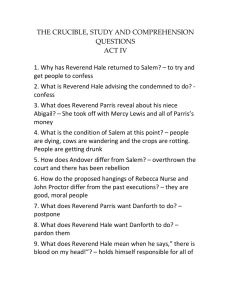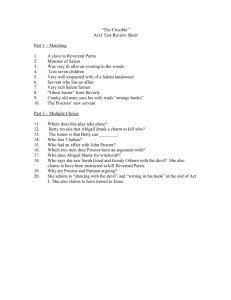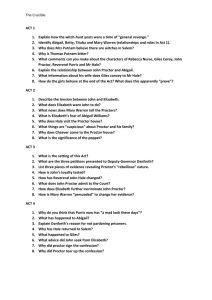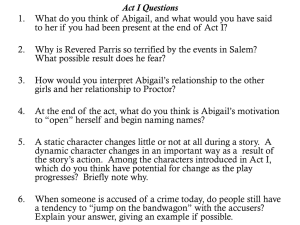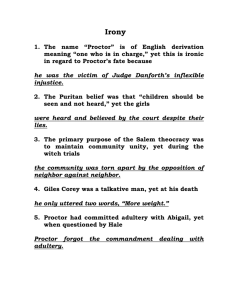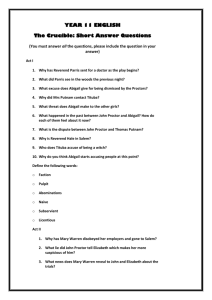The Crucible Study Guide: Act-by-Act Questions & Vocabulary
advertisement
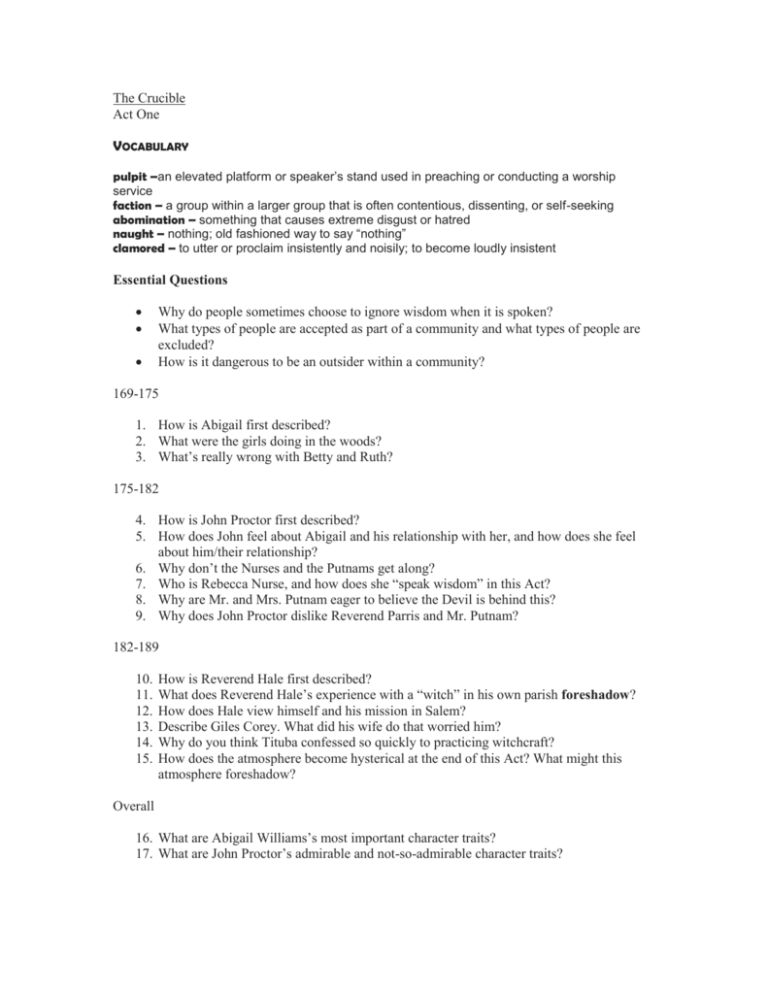
The Crucible Act One VOCABULARY pulpit –an elevated platform or speaker’s stand used in preaching or conducting a worship service faction – a group within a larger group that is often contentious, dissenting, or self-seeking abomination – something that causes extreme disgust or hatred naught – nothing; old fashioned way to say “nothing” clamored – to utter or proclaim insistently and noisily; to become loudly insistent Essential Questions Why do people sometimes choose to ignore wisdom when it is spoken? What types of people are accepted as part of a community and what types of people are excluded? How is it dangerous to be an outsider within a community? 169-175 1. How is Abigail first described? 2. What were the girls doing in the woods? 3. What’s really wrong with Betty and Ruth? 175-182 4. How is John Proctor first described? 5. How does John feel about Abigail and his relationship with her, and how does she feel about him/their relationship? 6. Why don’t the Nurses and the Putnams get along? 7. Who is Rebecca Nurse, and how does she “speak wisdom” in this Act? 8. Why are Mr. and Mrs. Putnam eager to believe the Devil is behind this? 9. Why does John Proctor dislike Reverend Parris and Mr. Putnam? 182-189 10. 11. 12. 13. 14. 15. How is Reverend Hale first described? What does Reverend Hale’s experience with a “witch” in his own parish foreshadow? How does Hale view himself and his mission in Salem? Describe Giles Corey. What did his wife do that worried him? Why do you think Tituba confessed so quickly to practicing witchcraft? How does the atmosphere become hysterical at the end of this Act? What might this atmosphere foreshadow? Overall 16. What are Abigail Williams’s most important character traits? 17. What are John Proctor’s admirable and not-so-admirable character traits? The Crucible Act Two VOCABULARY magistrate – a local official entrusted with the administration of laws blasphemy – the act of insulting, showing contempt for, or showing a lack of reverence for God lechery – immoderate indulgence in sexual activity; lewd or lustful behavior vengeance – with great force/vehemence; punishment in retaliation for an injury or offense conjure – to summon a devil or spirit by invocation or incantation; to practice magical arts Essential Questions Is it better to keep a secret to yourself if it would hurt your husband or wife to reveal it? Should sin or the status of one’s soul be matters of public concern? Should the government legislate matters of morality? 191-197 1. Do Elizabeth and John still care for each other? 2. Why is John afraid to tell everyone Abigail is lying? 3. Why does John get angry with Elizabeth? 197-201 4. 5. 6. 7. When Hale visits the Proctors, what makes him think they might not be good Christians? What important information does John Proctor give Reverend Hale about the entire case? How does Reverend Hale feel about Rebecca Nurse’s arrest? What is Hale’s opinion of the court? 202-205 8. Explain the significance of the doll Mary Warren gave to Elizabeth Proctor. 9. What does John Proctor mean when he says, “My wife will never die for me!” Overall 10. Describe Elizabeth Proctor. 11. What internal conflict is John now facing? 12. What major man vs. man conflict is set-up by the end of the act? John is the protagonist. Who will be the main antagonist? 13. Who is making accusations of witchcraft and why? 14. Why don’t more people speak out against the accusers? 15. What types of women were accused at first? How has this pattern changed now? Why might it have changed? The Crucible Act Three VOCABULARY contentious – likely to cause disagreement or argument; exhibiting a tendency to quarrels and disputes pretense – insincere or faked behavior; a claim that is not supported by fact contention – something (such as a belief, opinion, or idea) that is argued or stated in a debate; a position of competition unperturbed – calm and serene; unruffled or unstirred befuddled – to confuse muddle, or perplex Literary Vocabulary Situational Irony: a state of affairs or an event that is contrary to what one expects. Foil: a character who contrasts with another character in order to highlight particular qualities of the other character. Essential Questions What should people do if a friend needs help, but helping that friend might mean getting into trouble themselves? How should people respond when people in positions of authority are wrong? Why should constitute evidence in a court of law? Reading Questions 207-227 1. Fearful of being made to look bad, Danforth and Hathorne tell Proctor something about his wife in hopes of convincing him to drop the case. What to they tell him? Why does he later refuse to drop the case anyway? 2. How does Deputy Governor Danforth view himself? 3. What does Giles Corey allege about Thomas Putnam’s motives? 4. Hale suggests Proctor should have a lawyer. Why does he suggest this, and how does this show that his opinions have changed regarding what is going on in Salem? 5. What motivates John Proctor to reveal his affair with Abigail? 6. How is it ironic that Elizabeth Proctor fails to accuse John Proctor of adultery? 7. What do the girls do to convince the men that they are telling the truth? Why does Mary Warren turn on John Proctor after this? 8. Why is John Proctor arrested at the end of this Act? 9. Why does Hale say, at the end of the Act, “I denounce these proceedings, I quit this court!” How is he feeling? Overall 10. How is Miller's comment in the stage directions that Abigail, "out of her infinite charity, reaches out and draws the sobbing Mary to her" ironic? 11. Explain how Elizabeth Proctor is a foil for Abigail Williams. The Crucible Act Four VOCABULARY prodigious – strange/unusual; being an omen; extraordinary in size, amount or bulk cleave – to adhere firmly and closely or loyally and unwaveringly tantalize – to tease or torment by or as if by presenting something desirable to the view but continually keeping it out of reach scaffold – a platform at a height above ground or floor level; a platform used for beheading or hanging adamant – unshakable or insistent, especially in maintaining a position or opinion; unyielding Essential Questions We learn in textbooks that Puritans came to American to pursue religious freedom. How do the events of the Salem Witch Trials complicate our understanding of the Puritans as “lovers of freedom?” During the Salem witch trials, why would someone confess to being a witch even though it was not true? Why would someone refuse to confess to being a witch? Are your name, honor, and reputation more important than your life? How important is the truth? What danger lies in making a false confession? 229-240 1. Explain the significance of the image of cows wandering the road. 2. What does Reverend Parris report about Abigail Williams and Mercy Lewis, and why is he afraid for his safety? 3. Why do you think Danforth is said to be alarmed at the news that Abigail and Mercy Lewis have fled? What inner conflict may this news rouse in him? 4. What are Danforth’s reasons for receiving no pleas for pardon or for postponement of the executions? Explain the irony in Danforth refusing to pardon the remaining people. 5. Why do Parris and Danforth want Elizabeth to get John’s confession? 6. Does Elizabeth think confessing is the right thing to do? 7. Why does Reverend Hale tell the accused witches to confess? 8. According to Elizabeth, how did Giles Corey die? 9. Why does Proctor initially say he will confess? 10. Why does Elizabeth ask John to forgive her? 11. Miller ends the play with Proctor tearing up the confession and Elizabeth’s refusal to beg him to do what Danforth demands. Why did he tear it up? Why wouldn’t she plead with him? What theme message is he sending? 12. Explain the title, The Crucible. CRUCIBLE (n.) a pot in which metals are heated to a very high temperature and melted a difficult test or challenge a situation that forces people to change or make difficult decisions The Crucible Discussion Considering Character John Proctor o What motivated John Proctor to act as he did? o Is John Proctor a good man? Why or why not? o Does he redeem himself in the end? Elizabeth Proctor o What motivated Elizabeth Proctor to act as she did? o Was Elizabeth right to blame herself for John’s sins? o Is Elizabeth Proctor weak or strong? Abigail Williams o What motivated Abigail to act as she did? o How did Abigail get people to listen to her and obey her? o Is Abigail evil? Reverend Hale o What motivated Hale to act as he did? o Is Hale a wise man? o How is Hale a foil for Reverend Parris? Judge Danforth o What motivated Danforth to act as he did? o Is Danforth a wise man? o What does Danforth show us about authority?


